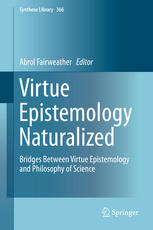

Most ebook files are in PDF format, so you can easily read them using various software such as Foxit Reader or directly on the Google Chrome browser.
Some ebook files are released by publishers in other formats such as .awz, .mobi, .epub, .fb2, etc. You may need to install specific software to read these formats on mobile/PC, such as Calibre.
Please read the tutorial at this link: https://ebookbell.com/faq
We offer FREE conversion to the popular formats you request; however, this may take some time. Therefore, right after payment, please email us, and we will try to provide the service as quickly as possible.
For some exceptional file formats or broken links (if any), please refrain from opening any disputes. Instead, email us first, and we will try to assist within a maximum of 6 hours.
EbookBell Team

4.4
92 reviewsThis book presents four bridges connecting work in virtue epistemology and work in philosophy of science (broadly construed) that may serve as catalysts for the further development of naturalized virtue epistemology. These bridges are: empirically informed theories of epistemic virtue; virtue theoretic solutions to under determination; epistemic virtues in the history of science; and the value of understanding.
Virtue epistemology has opened many new areas of inquiry in contemporary epistemology including: epistemic agency, the role of motivations and emotions in epistemology, the nature of abilities, skills and competences, wisdom and curiosity.
Value driven epistemic inquiry has become quite complex and there is a need for a responsible and rigorous process of constructing naturalized theories of epistemic virtue. This volume makes the involvement of the sciences more explicit and looks at the empirical aspect of virtue epistemology.
Concerns about virtue epistemology are considered in the essays contained here, including the question: can any virtue epistemology meet both the normativity constraint and the empirical constraint? The volume suggests that these worries should not be seen as impediments but rather as useful constraints and desiderata to guide the construction of naturalized theories of epistemic virtue.